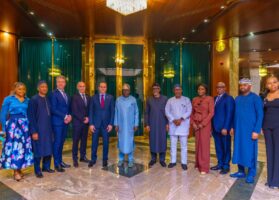United States (U.S.) President Donald Trump announced yesterday that he and Russian President Vladimir Putin will meet in Hungary to discuss an end to Russia’s war in Ukraine, following meetings next week between high-level delegations from both countries.
Trump said the agreement came after a “very productive” phone call, during which both leaders decided to send their respective teams ahead of the planned summit.
The U.S. delegation will be led by Secretary of State Marco Rubio, who also serves as the president’s national security advisor. While the precise location of the talks has not been finalized, Trump confirmed that he and Putin agreed to meet in Budapest.
“President Putin and I will then meet in an agreed upon location, Budapest, Hungary, to see if we can bring this ‘inglorious’ war, between Russia and Ukraine, to an end,” Trump wrote on his Truth Social platform.
He added that he would host Ukrainian President Volodymyr Zelenskyy at the White House today, saying, “President Zelenskyy and I will be meeting tomorrow, in the Oval Office, where we will discuss my conversation with President Putin, and much more. I believe great progress was made with today’s telephone conversation.”
Read Also
The announcement coincided with White House spokesperson Karoline Leavitt confirming that the call between Trump and Putin had concluded and included an agreement for next week’s meeting.
READ ALSO: Russia-Ukraine War: Putin Heads To Alaska Ahead Of Major Summit With Trump
Trump last met with Putin in August during a summit in Alaska, but diplomatic momentum toward ending the war in Ukraine has slowed over the past two months. The president has since been working with NATO allies to increase pressure on Moscow, including efforts to halt all purchases of Russian oil.
Trump said Wednesday that India had agreed to comply with his request, though he acknowledged that implementing the change would take time. India, however, pushed back on Trump’s remarks, noting that Russian crude imports help “safeguard the interests of the Indian consumer in a volatile energy scenario.”
“India is a significant importer of oil and gas. It has been our consistent priority to safeguard the interests of the Indian consumer in a volatile energy scenario. Our import policies are guided entirely by this objective,” said Randhir Jaiswal, spokesman for India’s Ministry of External Affairs.
Jaiswal added that New Delhi is “broad-basing” its energy sourcing and “diversifying as appropriate to meet market conditions.” On cooperation with the U.S., he said, “The current (Trump) administration has shown interest in deepening energy cooperation with India. Discussions are ongoing,” and that “we have for many years sought to expand our energy procurement,” a process that has “steadily progressed in the last decade.”





